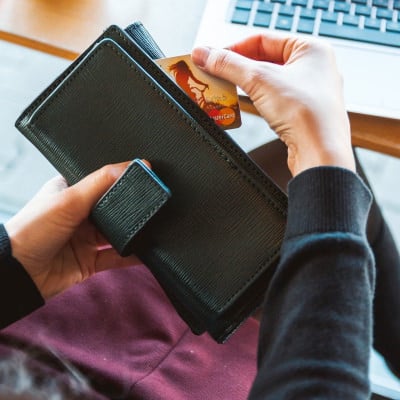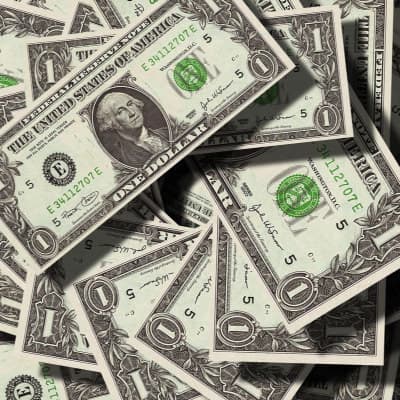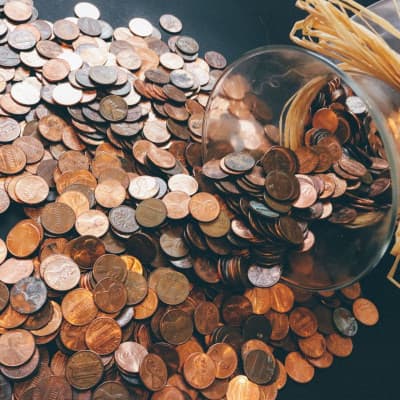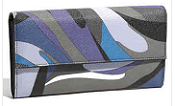This post may contain affiliate links and Corporette® may earn commissions for purchases made through links in this post. As an Amazon Associate, I earn from qualifying purchases.
2019 Update: We still stand by these thoughts on stashing your cash for your emergency fund — but you may also want to check out our more recent discussion on emergency funds, as well as our money roadmap to know what order to do personal finance tasks in.
Managing your money can be one of the most important things you do when you’re just starting a job — but it also can be super difficult. We’ve talked about the importance of an emergency fund, but we haven’t really had a good conversation about where to stash your money in general — a high-yield savings account? CDs? Treasury bills? The stock market? (Pictured: Emilio Pucci Print Flap Wallet, available at Nordstrom for $295.) (As always, please keep in mind that a) these are huge issues with a lot of nuances, and many personal finance sites, magazines, and books do a much better job with them, and b) I am by no means a personal finance guru — this is just some common, fairly basic knowledge that I’ve learned over the past 10 years or so.)

Before you decide where to save your money, though, you need to know the answers to some important questions first, though:
1) How much money do you need to live on before your next paycheck comes? What money is needed to pay recurring bills that will come due before then?
2) What is your idea of an “emergency” — and how quickly can you get your hands on enough money to cover it? For me, I can’t imagine there being any sort of emergency where my husband or I would need more than $5K within 24 hours (with no advance notice). This matters because of the different options out there in the market. For example:

- an online-only bank will often provide you with a higher interest rate than a brick-and-mortar bank will, but most of those banks don’t offer a checking account — so it can take 3-5 days to get your money out.
- Money market funds. This is actually where I kept the majority of my money when I was saving up to buy an apartment. At the time, the interest rate was great (as high as 7% at one point!), I could invest it in stocks or mutual funds immediately if I wanted to, but I could get it to my checking account in 3-5 days or so if I needed it. The interest rates are not guaranteed, though — when I realized I was getting about 1/10th of the monthly interest that I used to get, I looked into it, and the interest rate was less than a percentage point. Another major downside: these accounts are not FDIC insured (although the institution does try to maintain their value at $1 a share) — but if something happens in the market, you have no protection. Some banks offer money market accounts that ARE FDIC insured, but the interest rate will be less. (Right now, the interest rate for both money market funds and money market accounts stinks.)
- Stocks and mutual funds often allow you to withdraw funds immediately (although your broker may charge a penalty if you’ve only held the security for a short while) — but you’re subject to the whims of the market. If the market is having a bad week (or year, or decade) you could lose a lot of money. It can take a day or more for the sale to go through, and then another 3-5 days to transfer the money to your checking account.
- CDs, treasury bills, and bonds are all “safer” than stocks and mutual funds — you know the interest rate up front and shouldn’t be subject to the whims of the market — but for the best interest rates you consign your money away for 6 months (at a minimum) to 30 years, with huge penalties for taking it out early. (And of course, the best rates are for the longer Which means you can’t rely on that money in an emergency. Some people talk of “laddering” investments such as these so that every 6 months some of it becomes available. Let’s say you had $15K to invest — if you put $5K in a 6-month bill, $5K in a 1-year bill, $5K in an 18-month bill. In general, the longer you commit your money, the higher the interest rate, so after the initial cycle ends all of your money is earning the highest rate available, but you’ll have access to it every six months.
- Finally, 401Ks, IRAs, and other retirement vehicles pose huge penalties if you remove the money before you turn a certain age (I believe right now it’s 59 and a half). So: Definitely not good in an emergency.
Keep in mind that a true emergency (9/11, The Rapture, whatever) may require cash — and ATMs may not be working. So if you’re really concerned, you may want to keep some cash in your house, or even something like gold bars.

3) How comfortable are you with risk in general? Right now, most savings accounts will give you about 1.5% interest — which is a lousy, lousy interest rate. The last time I looked, CDs, bonds, and t-bills are providing only slightly better rates than that — and it wasn’t worth it to me to consign my money away for so long. (There may even be FDIC insurance for bank accounts and government-issued securities, so keep an eye out for that.) (Hat tip to commenters!) Stocks and mutual funds may give you returns of 7-15% (the average is allegedly 10%) — but if the market goes down, you go down with it.
4) How often do you want to move your money around? Interest rates change really frequently, and it’s a pain to open and close different accounts (or to keep the minimum in each one). Don’t get me wrong, you need to stay aware of what a competitive rate is and whether your bank is meeting it — like I said, it was a huge shock to me when my money market fund went from 7% to like .025% interest. But is it worth it moving your money from an account providing 1.5% interest to one providing 2.5% interest? That’s a question only you can answer.
{related: the best financial books for beginners (2018)}
For my own $.02, I have a tiered system when it comes to my money.
– Checking account: I really keep just the minimal balance, plus the amount needed to cover any bills due that month.
– Savings account (attached to checking): Right now, I keep a fairly minimal amount of money here also — if it grows to more than $5K I tend to move it to the next level. Pros: We can move it to checking pretty much instantaneously, either if cash withdrawals are greater than expected, or to cover us if an incoming check bounces or is delayed. Cons: The money is earning next to no interest.
– Online savings account. I’ve said it before and I’ll say it again: I love using Mint.com. One of the nicest things about it is that you can always run a search for the best interest that a bank is providing — as well as the best interest for CDs, the lowest rates for credit cards (useful if you don’t pay off your balance every month), and so forth. This is where we keep our emergency fund. It’s a low interest rate, but if my husband were to lose his job or this blog were to suddenly go south, we’d be able to live on the money for quite a while. We chose Capital One, which was offering about 1.5% interest plus a quarterly bonus) at the time we were looking. Taking a quick look at Mint, it looks like that’s down to about 1.08% interest (joy), but none of the competitors are offering more than 1.35% interest — so I’ll stay put. Similarly, the 1-year CDs seem to be 1.3% at their best, and a 5-year CD is, at best, 2.40% interest — so personally, for any investments beyond our retirement funds and our emergency fund, I’ll continue looking to the stock market. If you’re not a fan of Mint, check Bankrate.com or even Kiplinger’s Personal Finance.

– Retirement vehicles. I kind of forget about the money we put in our 401Ks, to be honest, because it doesn’t feel like “saving” — it’s just money that we don’t get in our paychecks. (Last year was the first year I contributed to an IRA, which is a different story, and because I’m contributing as a business owner probably not one worth getting into in the context of this blog.) Stay tuned in future columns — we should have a discussion about retirement vehicles and why they’re important. The short version: if your employer matches, you are an idiot not to contribute at least that amount if there is any way possible for you to do so. Free money is always nice.
– CDs, bonds, T-bills: If interest rates here were at all nice this would probably be the next place my risk-averse self would go — but right now the interest rates are so low (see above) that I’ll either play it safe with my online savings account or invest it more aggressively.
– Stocks and mutual funds. I read an article years ago which crunched the numbers and determined that if you had bought stock on the eve of the Great Depression, but held onto the stocks for enough time (we’re talking decades here), you still would have turned a major profit. This one article shaped my view of stocks and mutual funds — when I put money here I know that I’m in it for the long haul. If my investments are performing poorly I may sell some, usually near the end of the year as a tax write-off — but I hate losing money! This one is also deserving of a longer post, because there are a number of ways to figure out which stocks and funds to buy (ranging from financial advisers (look for one who gets a flat fee, not a commission) to index funds and target-date funds to various research tools).
Readers, where do you stash your cash? How often do you reevaluate?



Good Post
I’m so glad you’re writing about this. As soon as I paid off my law school loans, I started saving aggressively. I saved and saved for years and was a good girl and never spent close to what I made. HOW I WISH that someone had said something that spurred to me to actually INVEST my savings. Now I feel like an idiot for wasting all those years.
I think goals are tiered like this:
1. Immediately out of school: pay of loans and become debt free (goal: have enough extra income to save)
2. Save (goal: have enough savings to invest)
3. Invest (goal: create enough passive income to retire)
I think I was stuck at number 2 for too long.
Also, on the emergency fund, I am in southern California and my earthquake kit (a backpack in my trunk) includes an envelope of cash in small denominations. After the 1994 Northridge earthquake, my then husband and I walked all over LA looking for grocery stores that were open and had food. No one could take credit cards and ATMs didn’t work. Small bills were key because stores couldn’t make change.
Oneanon
Good post – how much cash do you keep on hand in your earthquake kit, if you don’t mind revealing? I’m trying to determine how much to keep on hand for similar reasons but having difficulty deciding on a number. Any advice welcome!
Anonymous
Not the original poster, but my dad always kept $200 in small bills and maybe $200-300 more in larger bills around the house for emergencies.
You should probably consider the following for any emergency type kit: The Red Cross doesn’t make it into “disasters” usually for about 3 days. If there’s a “catastrophe” (more then 10% of infrastructure destroyed – think Hurricane Katrina) it will take between 7 and 10 days. FEMA’s federal mandate is not to help disaster victims after a disaster, but to write checks to people afterward to compensate them for lost property/income. Most people don’t know that abut FEMA, so they get very angry when they think FEMA isn’t doing their job.
Linz
Thanks for this post! As a new grad, I know almost nothing about money/saving. Is there a required minimum amount of money you need to have before investing or putting money into bonds/CDs?
E
Requirements vary – $1000 is a typical minimum requirement, but you can sometimes start lower.
Please be aware that Kat is incorrect in suggesting that CDs, bonds, and t-bills are “federally insured” up to $250k.
Non-government bonds are typically not insured, and to the extent they are guaranteed, it is not via a program like the FDIC or subject to a $250k cap. Additionally, even when a bond is backed by the government and you assume the government isn’t going to default, you can still lose money prior to maturity (if new bonds are being issued with higher rates than your bond, no one is going to want your bond for face value, so if you want your cash back prior to maturity you’ll often have to accept less than what you put in).
Most CDs are FDIC insured, but always check.
Another misconception – some internet banks, despite not having branches, do issue debit cards and allow you access to your money quickly via ATMs. And, in personal emergencies or times when you need access to your money faster, there are typically ways to do quick wire transfers (though fees may apply). Others offer routine same-day or next-day ACH transfers, so shop around!
Fatwallet dot com has a finance forum with some stickied posts with good CD rates and Money Market savings rates, along with other basic account terms. That’s where I start when looking for a new place to park my cash.
Oneanon
“…some internet banks, despite not having branches, do issue debit cards and allow you access to your money quickly via ATMs.”
Yes. I keep a chunk of my emergency fund in my ING Direct Checking Account for this precise reason – in an emergency, and provided ATMs are still working, I can withdraw cash fast.
Anonymous
Anyone have an IRA or roth IRA with ING Direct? Any positive/negative thoughts?
Violet
I do (both traditional and roth IRA).
No complaints thus far. Interest rates stink, but that seems to be true for everything bank-related.
Oneanon
Do they let you invest the IRA in funds or is it just a straight savings vehicle?
Anonymous
I have a roth IRA with Charles Schwab– I do almost everything through them– my checking and investment accounts, as well my 401(k)(coincidentally). I also have a second checking account with a local bank. I cannot speak highly enough about Schwab. Everything is easy, and when I call the 800 number with a question, they’re friendly and always answer my question quickly.
Diana Barry
We are currently both doing renovations on our house, plus my husband has a consulting biz in addition to his “regular” job, so we keep quite a lot in our checking account to cover the payments on the renovations and the quarterly estimated tax payments, prob 50K between checking and ING. We also do a lot of retirement savings – I max out my 401k, my husband maxes out his, then he has a SEP plan for the consulting biz (with a much higher limit). Our extra goes into the taxable investment account, the 529 plans, or investing in very small companies (my husband’s particular interest).
Legal Marketer
I was just thinking about posting a question on this topic when Kat posted this. I’m starting a new job next month and the firm does NOT match 401(k) contributions. I’ve always contributed the max amount a firm would match, but if they’re not matching, should I?
If not, where is the best place for that money? B-school loans? IRA? Savings account? (We don’t have one. At all. We just somehow have managed to get through 10 years of marriage without needing it. We’ve had to put some things on credit cards and pay them off over time, but I’ve always wanted a savings account.)
Also, I’ll be getting about a 35% pay increase, so I’d love to hear some thoughts on where that money should go. On a related and relevant note, some of it will go towards the purchase of some desperately needed new clothes to keep me dressed appropriately at the new job, of course! But I have managed to order about $2500 worth of suits and work-appropriate items for $1450 from The Limited, Nordstroms and Talbots! (Several items will be going back, but I wanted to try a bunch of different stuff.)
IT Geek
Keep in mind that 401(k) contributions are not taxed. So, you might figure what your take home would be *without* any 401(k) contributions and then play with the numbers to see if you can get it about the same but *with* 401(k) contributions.
I contribute more than my company will match, but I already have savings and don’t have school loans.
SF Bay Associate
My firm doesn’t match at all, and I still max out my 401(k) to $16.5k a year. Because it’s pre-tax, it’s kinda like the government is “matching” part of my savings, and it reduces my overall tax burden. Or that’s how my fuzzy “lawyer math” works :).
Agree with others that you should not use your raise to boost your lifestyle as much as possible. Use that 35% bump to pay off debt and save. You should be saving at least 10%, and maxing out your 401(k) on top of that, and paying off debt on top of that. That’s easily more than the 35% raise.
As previous threads have stated, it’s also best to not buy a ton of new clothes when you start a new job – you may find yourself gravitating towards only a few of the new pieces. Better to start working and see what the office culture/style/temperature are first.
E
I would definitely establish a savings account with emergency savings (say, 6 months of living expenses) before addressing your other goals.
Beyond that, I’d think about both paying down b-school loans (particularly if the rates are high) and also contributing to your (un-matched) 401k because of the benefits of tax deferral.
I would really focus on not boosting your lifestyle (beyong job-necessitated clothing) with your incremental earnings. I don’t know all the details but it sounds like you and your husband have a money-in-the-checking-account-is-there-to-be-spent mentality. This raise is a great opportunity for you to work on nipping that habit in the bud.
Noner
I second the Emergency Fund – 6 months of living expenses (mortgage, utilities, loan payments) and having a separate Life Happens fund – for the car repairs that get sprung on you, or that furnace fix that wasn’t exactly planned.
This way the EF is for lose your job type emergencies, and the LH is for those everyday type emergencies, but doesn’t compromise your long term EF.
I also agree with E about not upping your lifestyle just yet. Get that savings – you never know when you’ll need it.
ADS
If you’ve only been contributing up to the match and haven’t been saving in any other retirement vehicles, then you are likely VERY far behind on saving for retirement. If you’re getting that much of an increase, start by designating 10% of your income for retirement. If the funds offered in your 401k are good and the fees aren’t high, start there because it’s easiest. If the options aren’t great and/or the fees are high, open an IRA through Vanguard or Fidelity. 10% is really the minimum you should be saving for retirement, and that’s if you start at the beginning of your first job. You’ll probably want to increase that number over time.
You also MUST have an emergency fund, with at least three months of expenses in it, preferably 6-12. Also, saving for big purchases is so much better than buying them first and paying them off (with interest) over time.
Once you’re contributing to retirement and have a small emergency fund established, throw all extra money at your debt (highest interest rate first) and pay it off. Debt free is the way to be. If you’ve been managing on your old salary, after an initial investment in some work-appropriate clothes, try to put ALL of the extra over and above what you used to earn towards savings and debt repayment. When the debt is paid off, you’ll have even more money to save, and you’ll be able to increase your spending moeny.
Best of luck!
Diana Barry
Yes! Contribute the max to your 401k that you can. It comes out pre-tax, so you pay less tax on the rest of your paycheck. I have always maxed out my 401k – never got a firm that matched until I moved to a smaller firm.
C
When you say max out your 401k, do you mean contribute up to the $16,500 (or whatever it is for your tax bracket) limit? I contribute about 15% of my paycheck, but maybe that isn’t a lot…
Mir
I disagree with some of the other posters here, depending on your new income. If you’re below the AGI limit, I would absolutely max out a Roth IRA (assuming you have no high-interest debt) before contributing unmatched money to a 401k, especially if you’re not impressed with the funds offered by your company’s 401k plan (almost all of mine underperform their benchmarks. grrrr). With a Roth, because you pay taxes before it goes in, you do NOT pay when it comes out — and since none of us knows what the tax code will look like upon our retirement, it’s a good way to have some “guaranteed” money sitting around.
For my $.02, I think it’s best to consult a financial advisor to get a “professional” opinion on optimizing your finances/minimizing taxes. Do your homework and find one who doesn’t work on sales commissions, and use some of that 35% raise to pay for a couple of meetings with him or her and set up a game plan.
AZ
I try to spend my paycheck (pay yourself first) in the following manner:
10% Emergency Savings (4-6 months of living)
10% Intermediate Savings (Christmas, Vacation, etc)
10% Retirement Savings (401K, IRA etc)
70% Living
When you get a raise, remember to increase your retirement savings by at least half the raise increase.
Especially in today’s interest rate market, I try to chase the best rates. I use a couple of links to help met.
High APY: http://www.fatwallet.com/forums/finance/783099/
CD’s: http://www.fatwallet.com/forums/finance/682884/
Retirement: http://www.fatwallet.com/forums/finance/194441/
Credit Cards: http://www.fatwallet.com/forums/finance/711457/
These forums are updated often.
For my emergency savings and intermediate savings, I tend to chase the rates because I use mint.com to track my budgets, expenses and all of my accounts.
I have rolled over an old401K account into a Vanguard IRA and will start to contribute to my new 401K as soon as I am eligible.
I have been actively working for about 6 years now, and I can safely say I have more money saved up then my parents have in their lifetime.
AZ
One last thing, I use USAA for my checking account. While there isn’t a brick and mortal where I live, I still have a debit card and USAA will reimburese ATM fees up to a certain amount each month.
MsZ
LOVE USAA! I particularly enjoy the schadenfreude that comes from watching friends walk six blocks out of their way on a Friday night to pull out cash from “their” bank, or wince at the fees. Thanks, DH, for your military service! And their customer service is fantastic.
And, AZ, I’m not sure if you made a typo, but I believe the saying is “brick and mortar.” I often spell phonetically idioms I’ve only heard, and am grateful to those who have corrected me – no snark intended.
anon
also love usaa! have everything there, mortgage car insurance banking investments, etc. not military myself, dad was, got in when i was 16.
erin
great post! :) love that you are writing about things that all (professional or not) women should know about.
A. L.
Another option is rewards checking accounts. They’re getting less rewarding as the banking regulations kick in, but you can aim to get 3-4% on balances up to $15-25,000. For example, mine was offering 4% up to $25,000, but just cut the max down to $15,000; the excess balance earns something like 0.5%)
The requirements to get the higher interest are typically along the lines of at least 10-15 debit card transactions per month, 1-2 direct deposit/bill pay/ACH transfer transactions per month, and opt to receive online-only statements.
You can search for these by reading the fatwallet forums, although I ended up finding mine at my parent’s small-town bank. Some have geographic limitations, and some aren’t FDIC-insured, so make sure you limit your search accordingly.
NoTrustFund
We keep a small amount in a brick and mortar bank. Similarly to Kat, when this amount gets much past $5k I move it elsewhere, either investing it at Vanguard or to a ‘high yield’ checking/savings account at ING Direct. This is after we contribute to our 401ks. 401k money is taken out pre-tax so I think it’s a good idea contribute even if you don’t get a match.
Our ING Direct account has our emergency fund (I’m super conservative so we currently have 12 months of expenses saved) and money we are saving for a new car and down payment on a house.
Vanguard is for our longer term savings that is invested in the markets. This includes general long term savings as well as college savings for our baby.
I hate that interest rates are so low and that our money is earning so little but I sleep better at night knowing the money we might need in the short term is in cash, readily available, and that it can’t lose value.
While I love ING Direct, they lowered their rate recently to 1-1.15% (depending on balance). If anyone has a bank they like that pays more, please let me know!
b23
I think I’m going to stash $295 of my cash at Nordstrom in exchange for that wallet. :)
Good Post (Again)
Hi, it’s I again.
The cash envelope in my earthquake kit is sealed and the good news is that it has been several years and I haven’t needed it. I think it has about three hundred dollars in it (give or take a hundred) and no bills larger than twenties. Mostly singles, fives and tens.
On the ten percent to retirement savings rule: is that ten percent of gross or net? If you’re contributing to a 401k/403b/457b, which reduces your gross, how do you figure the ten percent? Also, I contribute about twenty percent of my gross to my 457b and 403b (I max them both — I’m at a public university), so if I get a raise, do I still send half of the raise to retirement (my brokerage account because the 403 and 457 are maxed out), or can I/should I put it in my medium term savings, the next likely use of which will be to replace my 11 year old car? Own house with extremely reasonable mortgage and high equity. No debt. No kids. 45 years old.
Finally, I LOVE USAA! If you are eligible (any member of your current or former family served in the armed forces), this is where you should get your insurance. They are the best.
ADS
The 10% retirement savings rule is based on your gross. So if you make 100K before taxes, you want to put 10K away into retirement. If you’re doing that in a pre-tax vehicle like a 401k, it’s easy to do the math. If you’re using an after tax vehicle like a Roth IRA or Roth 401k, you’d put the same 10K after taxes, so assuming a 10% tax rate (to make the math easy) you’d put 9K away. Again, 10% is really the minimum needed for retirement: 15-20% is better, especially if you started late.
It’s up to you whether you think you’re already on track with your retirement savings and whether you want extra money to go to other goals. At the minimum, keep putting the same percentage away no matter how much more money you make: the question should be whether you also increase the percentage. And make sure you’re taking advantage of other tax-advantaged retirement savings vehicles, like IRAs, before you put retirement money in a fully taxed brokerage account.
Sara
I work hard all day and don’t have alot of time for this financial analysis. It is all so time consuming and complicated, and I think its’ so much easier to have my financial adviser take care of all of this for me and have him give me my shopping allowance.
A
Hope you have a good adviser!
Anonymous
The only thing I’m confused about in Kat’s post is the gold bars. Was it a joke? Because having 200 in cash on hand at midnight (or on a weekend) or during an emergency when the banks don’t work is much more helpful than having gold that will have to be eval’d and exchanged for cash.
And if there’s a real international type disaster that destroys the banking system having gold bricks that you are unable to mint into smaller amounts doesn’t help and I doubt that many people would be willing to exchange food, supplies or property for gold in such a situation. Gold’s worth is entirely dependent on there being enough food /extra supplies for people to be willing to spend them. You can’t drink gold in a desert, as they say.
Now I knew someone who used to keep pure silver coins around. (40-50 lbs) and he did have the tools to melt / reshape them. But he got sick of waiting for the apocalypse and sold them all to a dentist who made them into fillings.
kellyn
Haha I can just imagine gold bars lining her closet, just in case. Was it a joke?
E
There are definitely some end-of-world types who believe that in a true large scale crisis in which the government dissolves or similar, that paper money won’t hold value and only universally valuable things like gold will do you any good. A “bar” of gold (especially at today’s prices) is probably not what you want, but some smaller gold coins are a possibility. One of my (Jewish) grandfather’s siblings in Germany during the Holocaust was able to get past more than one border guard with diamonds and some gold (though cash may have done the trick in this situation too – not sure).
That said, I think the advice is overkill and I haven’t adopted it.
EK
I keep a buffer of $1,500 in the savings account linked to my checking. If I need cash NOW, I can access that money immediately. That’s also the amount I need to avoid balance-related fees on that checking account… which is NOT a coincidence. :)
I have the bulk of my emergency fund at ING, which is currently offering 1 percent. I like their services and I want to avoid opening too many accounts, so I’m not interest-rate hunting between savings accounts. I’m thinking of laddering slowly into I-bonds, though. They offer at least the rate of inflation (now 4.6%) and are redeemable after a year with only a modest interest penalty. Not too bad.
federal reserve notes backed by gold
I’m more than happy to uncover this website. I want to to thank you for ones time for this particularly fantastic
read!! I definitely really liked every little bit
of it and i also have you book-marked to look at new things in your web site.